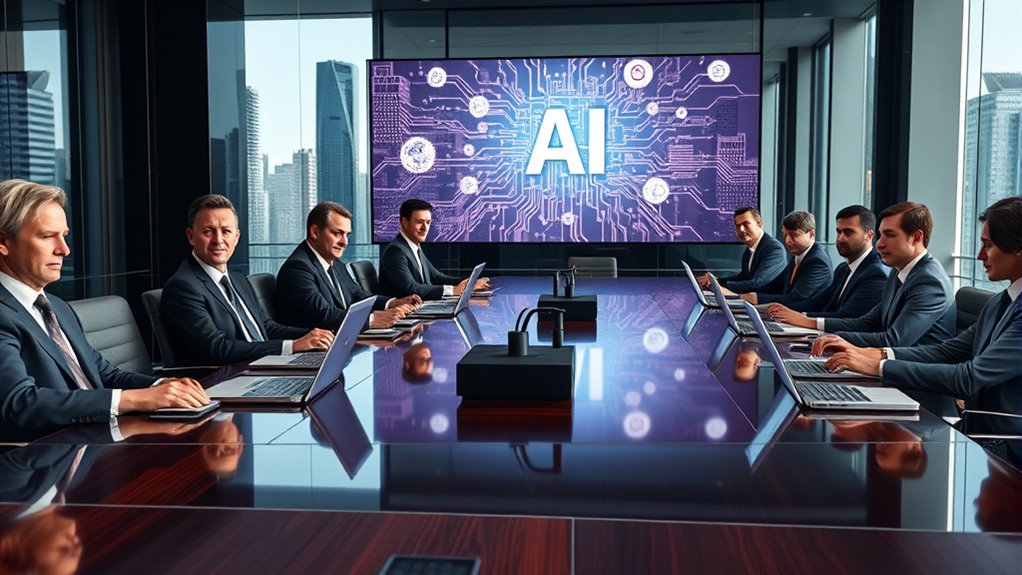Top CEOs warn that rapid AI advancements could replace millions of white-collar jobs, transforming how you work and redefining careers. As automation takes over tasks, many professionals may face displacement, making reskilling essential. Ethical concerns grow as AI systems become more sophisticated, emphasizing the need for responsible deployment. To understand how organizations are planning to adapt and what steps you can take, keep exploring these critical developments.
Key Takeaways
- Top CEOs warn that AI advancements could lead to the displacement of millions of white-collar jobs.
- Automation and AI systems are replacing tasks traditionally performed by professionals in various industries.
- The shift in workforce roles necessitates widespread reskilling and adaptation efforts.
- Ethical deployment of AI is crucial to prevent biases and ensure fair decision-making.
- Managing AI’s growth responsibly is essential to avoid negative societal impacts and workforce disruption.

As artificial intelligence continues to advance at a rapid pace, top CEOs are warning that millions of white-collar jobs could soon disappear. This looming shift isn’t just about automation replacing tasks; it’s about redefining what work means for you and your career. As AI systems become more sophisticated, questions around AI ethics grow more urgent. You need to contemplate not only how AI can improve productivity but also how it impacts fairness, transparency, and accountability. The ethical deployment of AI isn’t optional anymore — it’s essential to guarantee that technological progress doesn’t come at the expense of societal values or widen inequalities. CEOs are emphasizing the importance of establishing guidelines that prevent biases embedded in algorithms from affecting hiring, lending, or decision-making processes. If these concerns aren’t addressed, you risk working in an environment where AI-driven decisions are opaque and potentially unfair, which could undermine trust and create new challenges for workforce management.
Meanwhile, workforce adaptation remains one of the most critical issues. As AI takes over repetitive or data-intensive tasks, you’ll need to upskill or reskill to stay relevant. Many organizations are investing in training programs designed to equip employees with skills in AI oversight, data analysis, and other areas where human judgment remains crucial. You, as part of this evolving landscape, should be proactive about learning new competencies that complement AI technologies. This isn’t just about surviving job displacement; it’s about thriving in a future where humans and AI work side by side. The companies that succeed will be those that prioritize workforce adaptation, fostering a culture of continuous learning and agility. They’ll support employees in shifting to new roles that leverage uniquely human qualities like creativity, emotional intelligence, and complex problem-solving.
CEOs recognize that managing this shift responsibly requires a strategic approach that balances technological innovation with ethical considerations and workforce resilience. If you ignore these aspects, you risk facing backlash from employees, regulators, and the public. Conversely, by embracing AI ethically and preparing your workforce for change, you position yourself to harness AI’s full potential while minimizing disruption. The conversation around AI ethics and workforce adaptation is no longer theoretical; it’s about how you navigate the real-world implications of AI’s rapid growth. As you move forward, remember that the key isn’t just about implementing AI but doing so thoughtfully, ethically, and with a clear plan to support those whose jobs are at stake.
Additionally, understanding emotional support can help organizations foster resilience and well-being during these transitions, ensuring that employees feel valued and supported throughout change processes.
Frequently Asked Questions
How Soon Could AI Impact White-Collar Employment Globally?
AI could impact white-collar employment globally within the next 5 to 10 years. You should stay informed about AI ethics, as responsible implementation is essential. Workforce adaptation will be key; embrace learning new skills now to remain competitive. Prepare for automation by understanding how AI can complement your role, rather than replace it, and advocate for policies that support ethical AI use and worker transition strategies.
What Industries Are Most Vulnerable to AI Job Replacement?
You’ll find finance, marketing, and management most vulnerable to AI job replacements. Creative automation streamlines tasks, but ethical considerations cloud the passage, raising questions about job security. As AI advances, these industries face fierce competition from automation, prompting you to prepare for potential shifts. Staying informed and adaptable helps you navigate the new normal, ensuring you’re not left behind in this rapidly evolving, AI-driven world.
Are There Any Measures to Prevent Mass Unemployment Due to AI?
Yes, measures like Universal Basic Income and vocational training can help prevent mass unemployment due to AI. You can support policies that provide financial security while you acquire new skills through training programs. Governments and organizations are working on these solutions to ensure you’re protected and adaptable as AI transforms workplaces. Staying informed and upskilling yourself will be key to steering this evolving job landscape effectively.
How Will AI Affect Income Inequality and Social Mobility?
AI will likely widen income disparity and deepen social stratification if we don’t take action. You may find the wealth gap growing as high-skilled workers benefit most, while others struggle to adapt. To prevent this, you should support policies promoting education, retraining, and equitable access to AI’s advantages. By actively addressing these issues, you can help create a more inclusive society where social mobility isn’t stifled by technological inequality.
What Skills Should Workers Develop to Stay Relevant?
To stay relevant, you should focus on reskilling strategies and prioritize lifelong learning. Develop skills in areas AI can’t easily replicate, such as critical thinking, creativity, emotional intelligence, and adaptability. Embrace new technologies and continuously update your knowledge to keep pace with changing industry demands. By actively investing in your growth, you’ll remain valuable in the evolving job market and reduce the risk of displacement caused by AI advancements.
Conclusion
So, are you ready to adapt in this rapidly changing landscape? As top CEOs warn, AI has the potential to replace millions of white-collar jobs, shaping the future of work. You can’t ignore the shift — instead, embrace lifelong learning and develop new skills. Will you let AI define your career, or will you stay ahead of the curve? The choice is yours in this new era of technology and opportunity.











